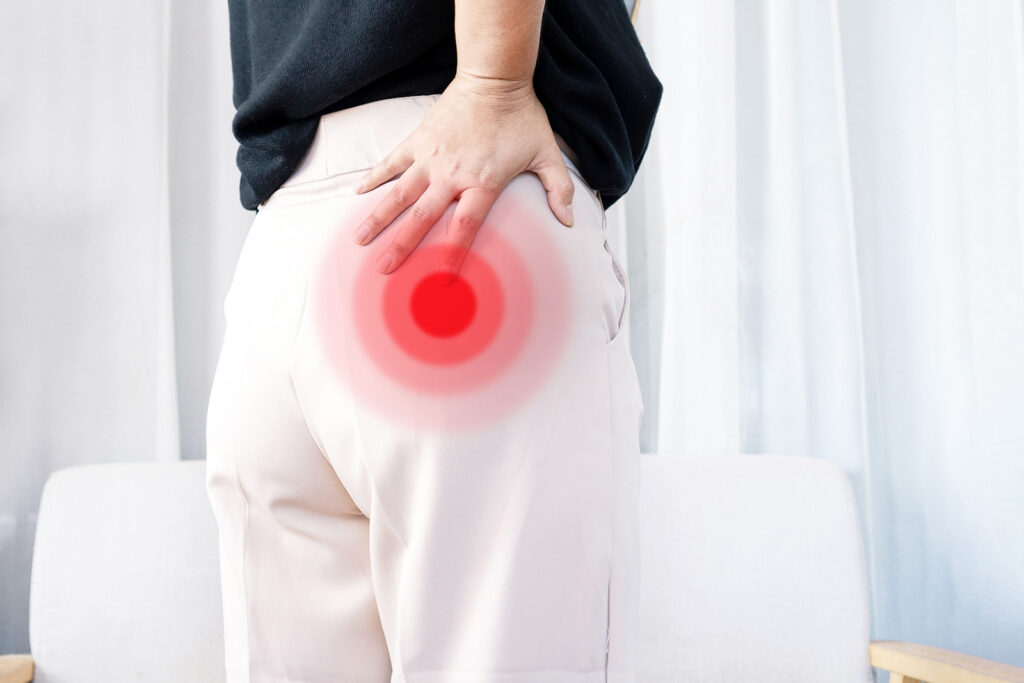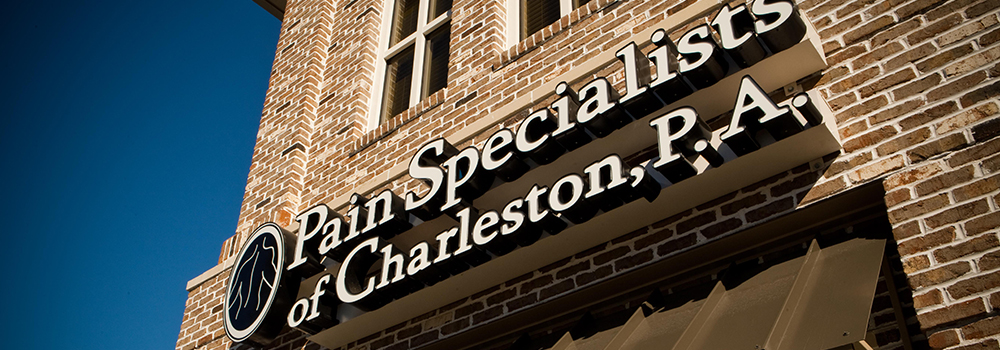There are some things in our lives that are just a pain in the butt, and then there is just plain, old-fashioned pain in the butt. Although your butt may be behind you, the problems and pain you experience are not.
Your buttocks are composed of fat and gluteal muscle, making them more prone to injury and disease, ranging from minor muscle strains to severe infections. Whether you are experiencing butt pain when sitting or even pain in the buttocks during pregnancy, you deserve to find relief.
Follow along as the Pain Specialists of Charleston guide you through the potential causes behind your butt pain and how we can help you find relief – without habit-forming drugs or surgery!

What’s Causing the Pain in My Buttocks?
There are several different conditions that could be the reason behind your butt pain, each producing its own set of symptoms. Common symptoms of pain in the buttocks can include shooting, burning, tingling, or aching sensations, developing suddenly, or building in severity over time.
Here are some of the most common causes behind the pain in your butt:
Bruising
Suffering from a fall on the stairs can lead to one of the most common causes of buttock pain – bruising. The swollen black-and-blue lump is caused by blood from damaged blood vessels pooling under the skin. While you may experience some tenderness in the bruised area for a while, the bruise will eventually heal over time.
Muscle Strain
If you’ve ever gone too hard in a workout or failed to warm up beforehand (we’ve all done it), chances are you’ve experienced muscle strain. Your buttocks are composed of three muscles: the gluteus maximus, gluteus medius, and gluteus minimus.
You can suffer a muscle strain in any of these muscles, resulting in swelling, tenderness, or stiffness to the affected muscle.
Sciatica
If you have ever been the victim of lower back pain, chances are you have heard or come across the term “sciatica.” Sciatica refers to the compression of the sciatic nerve, the largest nerve in the body running from the lumbar spine of the lower back down through the buttocks to the back of the legs.
Sciatica can cause pain, tingling, numbness, or weakness in the buttock, back of the thigh, and/or below the knee. Sciatica is most often caused by a herniated disc and unfortunately becomes more common as we age.
Bursitis
Bursitis is a condition where the fluid-filled sacs that cushion the bones, called bursae, become inflamed. Bursitis is most often found to affect the shoulder (link to shoulder pain), hip, elbow, and knee.
Bursitis in the buttocks can either be trochanteric bursitis or ischial bursitis. Trochanteric bursitis occurs at the side of the hip where the thigh bone (femur) joins with the hip. Symptoms can include pain, tenderness, swelling, or weakness at the side of the hip and/or buttocks.
Ischial bursitis occurs when the ischial bursa in the buttocks becomes inflamed due to an injury or sitting for prolonged periods on hard surfaces. Symptoms can include swelling and redness, or butt pain when sitting or lying down.
Piriformis Syndrome
The piriformis is a muscle that runs down your lower back to the top of your thigh, overlaying the sciatic nerve. Injuries or overuse can cause the piriformis to tighten, resulting in this condition. Inflammation of the piriformis can also lead to increased pressure on the sciatic nerve, resulting in sciatica.
Pain may increase over time as more strain is placed on the piriformis muscle. You may notice increased pain with piriformis syndrome when you walk upstairs, run, or sit.
Sacroiliac Joint Dysfunction
Your sacroiliac joint connects the sacrum – the triangular bone at the base of your spine – to your pelvic bone. Pregnancy, childbirth, injury to the spine or pelvis, and muscle imbalances can cause the joint to become inflamed or shift out of normal alignment.
Sacroiliac joint dysfunction can cause deep pain in the upper butt and radiate down to the upper part of your leg.
Coccydynia
If you have ever taken a hard fall on your tailbone, you may have experienced coccydynia. A fall on your coccyx, or tailbone, can result in a tailbone fracture or bruise to the tissue around your tailbone. This can cause severe pain and discomfort, especially when sitting.
There can be many underlying causes for your butt pain, from a simple (yet painful) bruise to a severe fracture. If you are experiencing buttocks pain, visit a pain management clinic near you to rule out any serious conditions or injuries.
When Should I Visit a Pain Management Physician?
If the pain in your buttocks has not improved in a few days or persists for more than a week, it may be time to schedule a visit with one of our pain management physicians.
Ongoing pain could be a sign of a more serious injury, so it’s important to start the journey to relief as soon as possible. Certain signs and symptoms of buttocks pain could also indicate a visit to Pain Specialists of Charleston, including:
- Pain impacts your ability to walk, stand, or sit
- You can’t move your hip without experiencing pain
- Burning, numbness, tingling, or weakness in your hip, leg, or buttocks
- Pain or difficulty passing bowel movements
- Fever, fatigue, or unexplained weight loss
Take a Seat – Key Takeaways for Dealing with Butt Pain
We know we provided a lot of information regarding the pain in your butt. So, if looking into different conditions and symptoms was too much for you, here are some key takeaways to finding relief for the pain in your butt:
- If your pain persists longer than a week or symptoms worsen, schedule an appointment with a pain management physician.
- Our physicians will perform a physical exam and conduct imaging tests to help determine the root cause of your pain and develop an interventional pain management treatment plan designed for you.
- The road to pain-free buttocks and pain management in Charleston, SC is within reach – it all starts with an appointment!
Butt Pain is a Pain in the Butt–Get the Help You Need with Pain Specialists of Charleston!

Butt pain is a pain in the butt, hindering your ability to go about your daily routine and making the simplest tasks incredibly challenging.
But we want you to know that you don’t have to live your life in pain or rely on surgery or medication to ease your worries.
At Pain Specialists of Charleston, we offer the latest treatments in interventional pain management near you, intending to help you alleviate and manage your pain.
Whether a recent injury brought you in for a visit or ongoing pain, we will help you find relief and reclaim your quality of life!
Request Appointment | Contact Us | Meet Pain Doctors | Visit Us
Additional Helpful Articles:
What Should I Expect During My First Pain Management Appointment?
Interventional Pain Management: Everything You Need to Know
What Does a Pain Management Physician Do?
Does Cracking Your Knuckles Cause Arthritis?
What’s the Best Leg Pain Treatment Without Surgery?
When Should I See a Doctor for Runner’s Knee?
Why Do Side Sleepers Wake Up to Shoulder Pains?
How Can I Get Immediate Relief for Sciatic Pain?
Get to Know Pain Management Physicians:
Our Services:
Diagnosis | Treatment | Interventional Pain Management | TRICARE | Wellness | Clinical Trials | Worker’s Compensation | Neurology | Imaging/ MRI
Published July 2024
